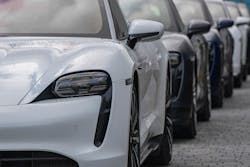Porsche believes suppliers must help meet green goals
By Ron Shinn
Plastics processors generally agree with the idea of green manufacturing, and a few are taking small steps in that direction as long as it does not cost too much money. Achieving green manufacturing might come someday, they say, but not soon.
Actually, it might be sooner than we think. Porsche AG, part of the Volkswagen Group, announced in July that it wants its 1,300 suppliers to exclusively use renewable energy to manufacture Porsche components. The German manufacturer of high-performance sports cars said suppliers that do not comply will not be considered for future contracts.
Porsche said its battery cell suppliers have been required to use green energy since last year and other suppliers are now required to do the same. “We recognize that we have a responsibility to ensure that supply chains are transparent and sustainable,” said Uwe-Karsten Städter, executive board member for procurement at Porsche.
Porsche says it wants its entire supply chain to be carbon dioxide (CO2) neutral by 2030. Currently, the supply chain is responsible for about 20 percent of Porsche’s total greenhouse gas emissions. That number is expected to rise to about 40 percent by 2030 due to electrification of vehicles. That’s the reason for throwing down the gauntlet now.
Achieving carbon neutrality means a manufacturer has reduced the CO2 the plant emits to zero. It can be achieved by improving operational efficiencies to use less energy; switching to cleaner fuel sources such as natural gas or solar or wind power; and purchasing renewable energy credits and carbon credits to offset emissions it cannot eliminate.
Porsche built just 272,162 vehicles last year. General Motors built more than 6.8 million. By forcing suppliers to switch to certifiable renewable energy, Porsche will barely cause a blip in CO2 reduction worldwide. But it is a highly visible and socially responsible move that other car makers are bound to notice.
Volvo has recently achieved climate-neutral status for a plant in Sweden. Climate neutrality means the plant emits no net increase of all greenhouse gases, which is more difficult to achieve than carbon neutrality. Volvo is owned by Zhejiang Geely Holding (Geely Holding) of China.
If you are one of the thousands of automotive suppliers, it might be worth at least thinking about how your plant could pivot to renewable energy. It might get easier to do that as time goes on and more options become available, but the point at which you must take action might not be your call.
Mandates to suppliers to clean up their emissions probably won’t be made by just automakers. Retailers are already demanding green packaging. Manufacturers of high-end hard goods could see it as a way to differentiate their brand from competitors, and plastics processors will have to go along to maintain business.
Will bankers and investors eventually move away from supplier companies that cannot qualify for business from OEMs like Porsche? Will a supplier business lose appeal in the mergers and acquisitions market if it is not keeping pace with adopting green manufacturing practices?
Porsche is not the first name that comes to mind when we think about green manufacturing, but it has been quick to embrace it. Porsche’s factory in Zuffenhausen, Germany, which manufactures the all-electric Taycan Cross Turismo model, has been carbon-neutral since 2019. All other plants, plus the headquarters in Stuttgart, have been carbon-neutral since last year.
Automotive plants in Europe are mostly assembly plants where few components are actually made. Parts are manufactured by suppliers and shipped to the assembly plants, so automakers generally have little oversight of suppliers other than accepting or rejecting parts.
Mandating that suppliers reduce CO2 emissions is an admirable move for Porsche to make. I expect we will see similar mandates from other automakers, as well as OEMs outside of the automotive industry. As part of the supply chain, plastics processors need to be ready.
Another way to think about this is whether it is better for governments to regulate manufacturing emissions or to let the free market take care of it. I believe this is an example of the free market doing what it should do. The results might come more quickly with markets providing an incentive to suppliers.
Porsche buyers can demand certain standards from their car manufacturer and might buy another brand if Porsche does not respond. Porsche believes customers want greener vehicles, and it is responding with a promise that by 2030 more than 80 percent of the cars it sells will be all-electric or plug-in hybrid models.
It is not much of a stretch to see why Porsche wants to get ahead of the market in both the cars it produces and the environmental impact it has in producing them. Keep an eye on how this unfolds.
Ron Shinn, editor
Read more
Here’s some of our recent coverage on the future of plastics in the automotive market.
• Changing car designs and the rise of EVs create opportunities for molding machinery makers.
• Vehicle lightweighting will become even more important to offset heavy batteries in EVs, say industry experts.
About the Author
Ron Shinn
Editor
Editor Ron Shinn is a co-founder of Plastics Machinery & Manufacturing and has been covering the plastics industry for more than 35 years. He leads the editorial team, directs coverage and sets the editorial calendar. He also writes features, including the Talking Points column and On the Factory Floor, and covers recycling and sustainability for PMM and Plastics Recycling.
